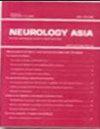Integrin alpha-4 gene polymorphism in relation to natalizumab response in multiple sclerosis patients
IF 0.3
4区 医学
Q4 CLINICAL NEUROLOGY
引用次数: 0
Abstract
Objectives: The aim of this study was to assess the possible the association between +3061 (G>A, rs1143676) missense mutation in exon 24 of the integrin α-4 subunit (ITGA-4) gene and the response to natalizumab in a sample of Iraqi multiple sclerosis patients. Methods: A sample of 59 patients with multiple sclerosis (16 males and 43 females; mean age of 32 years; age range of 15 to 52 years) receiving natalizumab for at least 12 consecutive months were involved in the study between March and August/ 2022. The sample was categorized into two groups according to their response to natalizumab treatment (responders and non-responders). Polymerase chain reaction and Sanger’s sequencing for the extracted deoxyribonucleic acid was performed to identify the polymorphism at ITGA-4 gene promoter region. Results: The 3061 AA and AG genotypes were present in both groups (responders and non-responders to natalizumab treatment) with the lack of the wild form GG genotype. The AG genotype was significantly present in the non-responders’ group and appeared to have a significant impact on the responsiveness to natalizumab by increasing the propensity of being non-responder with a positive correlation (Phi-coefficient of 0.294) on the contrary of AA genotype. Conclusion: The +3061 (G.A) missense mutation is related to the response to natalizumab in multiple sclerosis patients with the AG genotype, thereby increasing the likelihood of non-response significantly.整合素α -4基因多态性与多发性硬化症患者纳他珠单抗反应的关系
目的:本研究的目的是评估整合素α-4亚基(ITGA-4)基因第24外显子+3061 (G b> A, rs1143676)错义突变与伊拉克多发性硬化症患者对natalizumab的反应之间的可能关联。方法:59例多发性硬化症患者(男16例,女43例;平均年龄32岁;在2022年3月至8月期间,接受natalizumab至少连续12个月的年龄范围为15至52岁的患者参与了这项研究。样本根据对natalizumab治疗的反应分为两组(反应者和无反应者)。对提取的脱氧核糖核酸进行聚合酶链反应和Sanger测序,鉴定ITGA-4基因启动子区多态性。结果:3061 AA和AG基因型均存在于两组(对那他珠单抗治疗有反应和无反应),缺乏野生型GG基因型。AG基因型在无应答组中显著存在,与AA基因型相反,AG基因型通过增加无应答倾向而显著影响对natalizumab的应答性(phi系数为0.294)。结论:+3061 (G.A)错义突变与AG基因型多发性硬化症患者对natalizumab的应答相关,从而显著增加无应答的可能性。
本文章由计算机程序翻译,如有差异,请以英文原文为准。
求助全文
约1分钟内获得全文
求助全文
来源期刊

Neurology Asia
CLINICAL NEUROLOGY-
CiteScore
0.30
自引率
0.00%
发文量
76
审稿时长
>0 weeks
期刊介绍:
Neurology Asia (ISSN 1823-6138), previously known as Neurological Journal of South East Asia (ISSN 1394-780X), is the official journal of the ASEAN Neurological Association (ASNA), Asian & Oceanian Association of Neurology (AOAN), and the Asian & Oceanian Child Neurology Association. The primary purpose is to publish the results of study and research in neurology, with emphasis to neurological diseases occurring primarily in Asia, aspects of the diseases peculiar to Asia, and practices of neurology in Asia (Asian neurology).
 求助内容:
求助内容: 应助结果提醒方式:
应助结果提醒方式:


